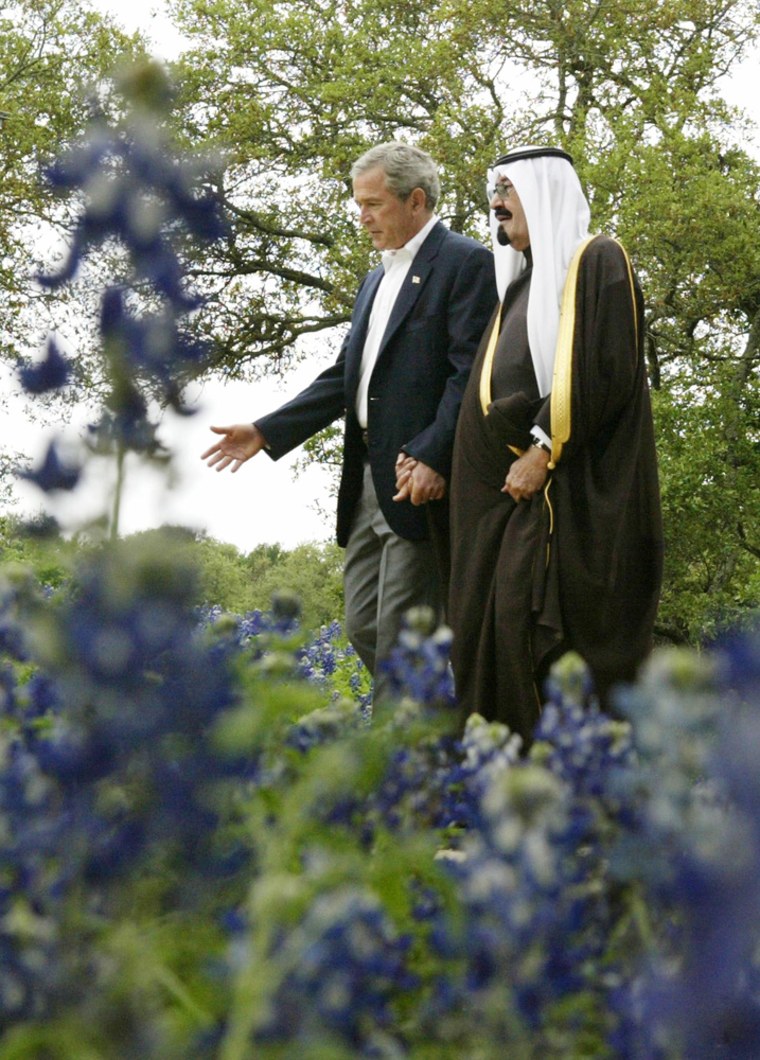President Bush on Monday pressed Saudi Arabia's Crown Prince Abdullah to help curb skyrocketing oil prices that are hurting American families and businesses, and a top adviser said a Saudi plan to increase production would help.
“When you increase the capacity by a significant amount, which they are talking about, that can't help but have a positive downward effect on prices,” said Bush's national security adviser, Stephen Hadley.
Because of a drop in crude oil prices and slightly lower demand, gas prices dropped slightly between April 8 and April 22. But prices at the pump still average more than $2.27 per gallon nationwide.
As Bush and Abdullah met for several hours at the president's ranch, the Saudis presented a plan — outlined last week in a speech by Saudi Oil Minister Ali Naimi — to increase production capacity to 12.5 million barrels per day by 2009 from the current 11 million limit.
If necessary, Saudi Arabia would eventually develop a capacity of 15 million barrels per day. The kingdom now pumps about 9.5 million barrels daily.
The Saudis also raised the separate problem that drives up prices — limited refining capacity.
“We are willing to sell oil to anyone who wants to buy it,” said Adel Al Jubeir, a Saudi foreign affairs adviser. “You can't just physically produce a barrel and just drop it on a sidewalk.”
Hadley said the two sides would need further discussions on that issue.
Appealing to self-interest
Before the meeting at Bush's ranch, the president told reporters he would appeal to Abdullah’s self-interest, telling him that persistent high crude prices could erode the long-term market for Saudi Arabia’s biggest source of revenue.
He said he would urge Saudi Arabia to make the necessary investment to increase its production capacity, especially in light of the fast-growing, energy-gobbling markets in China and India.
“A high oil price will damage markets, and he knows that. I look forward to talking to him about that,” the president said as he and Vice President Dick Cheney awaited the arrival of the Saudi officials. “We’ll talk about his country’s capacity.”
Difficult test for democracy
Abdullah and his small entourage were nearly a half-hour late, but Bush gave Saudi Arabia’s de facto ruler a warm embrace and a kiss on both cheeks in welcome. Bush kept a firm, guiding grip on his guest’s hand as they walked up the path, past a field of bluebonnets that the president took care to point out, to a new office building on a corner of the sprawling ranch.
Bush’s goal of spreading democracy across the Arab world also faces a difficult test with Saudi Arabia, a longtime ally ruled by absolute monarchy. Traditionally Bush holds news conferences with visiting foreign leaders, but there will be none during this visit because Abdullah rarely talks with the media.
The president got around that by emerging from the building well before Abdullah’s arrival and engaging in what was made to appear to be an impromptu exchange with the reporters gathered there.
Monday’s meeting also marked
another step in a quickening pace of U.S. involvement in the Mideast.
Plan for broader Mideast calm?
Abdullah pushed his plan for a broad settlement of the Middle East conflict that would call on Israel to withdraw from Arab lands occupied in the 1967 Middle East war.
Under his plan, Arab states would normalize ties with Israel in exchange for the full withdrawal.
But Hadley, the national security adviser, said that if the partial pullout envisioned by Israel is carried out successfully, it would help the parties move toward the broader issues.
“So the focus has been very much what we can all do — the United States, Saudis and others — to assist the Palestinians to be able to develop the institutions of a democratic state that is prepared to take responsibility for the territory that they are going to get,” Hadley said.
Two weeks ago Bush met at the ranch with Israeli Prime Minister Ariel Sharon, and said Israel should abandon plans for new construction of Jewish settlements in the Palestinian territories.
The Saudis believe the administration’s strong support for Israel harms prospects for Middle East peace.
Friendlier times
Despite the difficult matters, Robert Jordan, a former U.S. ambassador to Saudi Arabia, said the stage was set for a much friendlier meeting than three years ago for Abdullah’s first visit to the ranch. For one thing, the late Palestinian leader Yasser Arafat, a polarizing figure, is now gone — replaced by Mahmoud Abbas, an elected president of the Palestinians. Abbas will have his own meeting with Bush in the next few weeks.
Jordan noted that Saudi officials also have played an instrumental role in persuading Syria to withdraw its troops from Lebanon. They have been supportive of increasing oil production at crucial times.
And Abdullah has taken some initial steps toward introducing democracy to Saudi Arabia by holding elections for municipal councils, even though women’s rights remain severely restricted, political parties are banned and press freedoms are limited.
“This is an important relationship — (my) personal relationship with the crown prince is important,” Bush said.
WTO deal ‘very close’
Meanwhile, Al Jubeir said Saudi Arabia is “very close” to reaching an agreement with the United States on the kingdom’s entry into the World Trade Organization.
The Saudi foreign affairs adviser told reporters that there were only a few technical matters that still needed to be worked out and he expected they would be resolved soon.
“The two countries have come very, very close to reaching a bilateral agreement on trade,” Jubeir said.
“I believe that the issues that remain to be resolved involve technical matters that should be resolved and we expect to have (them) resolved very shortly,” he added.
